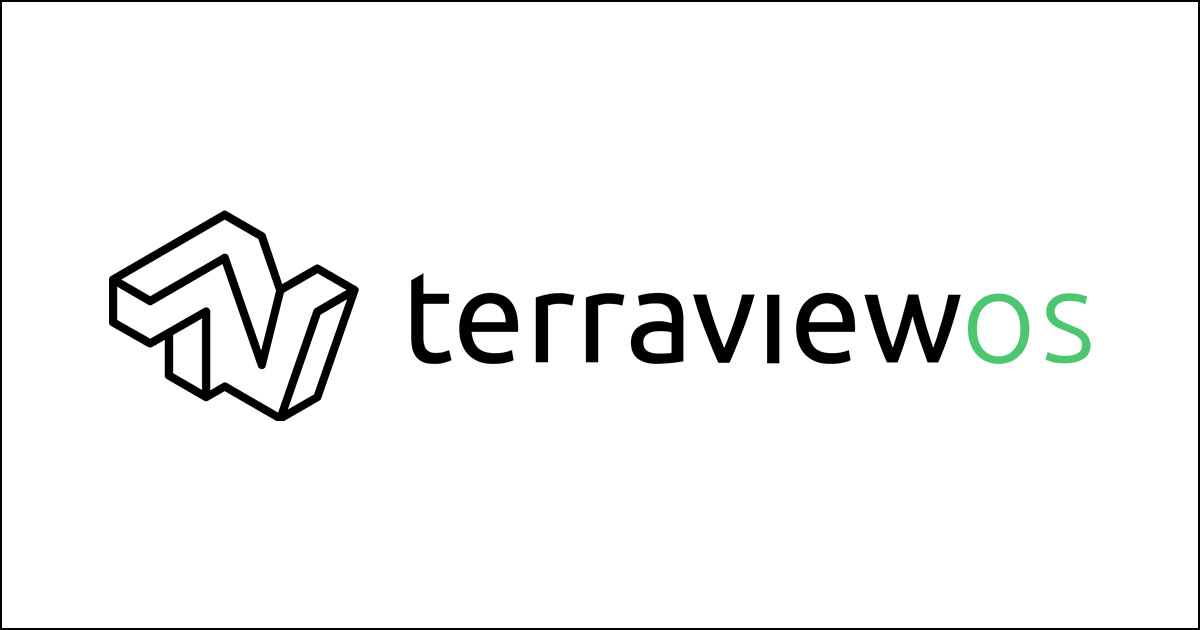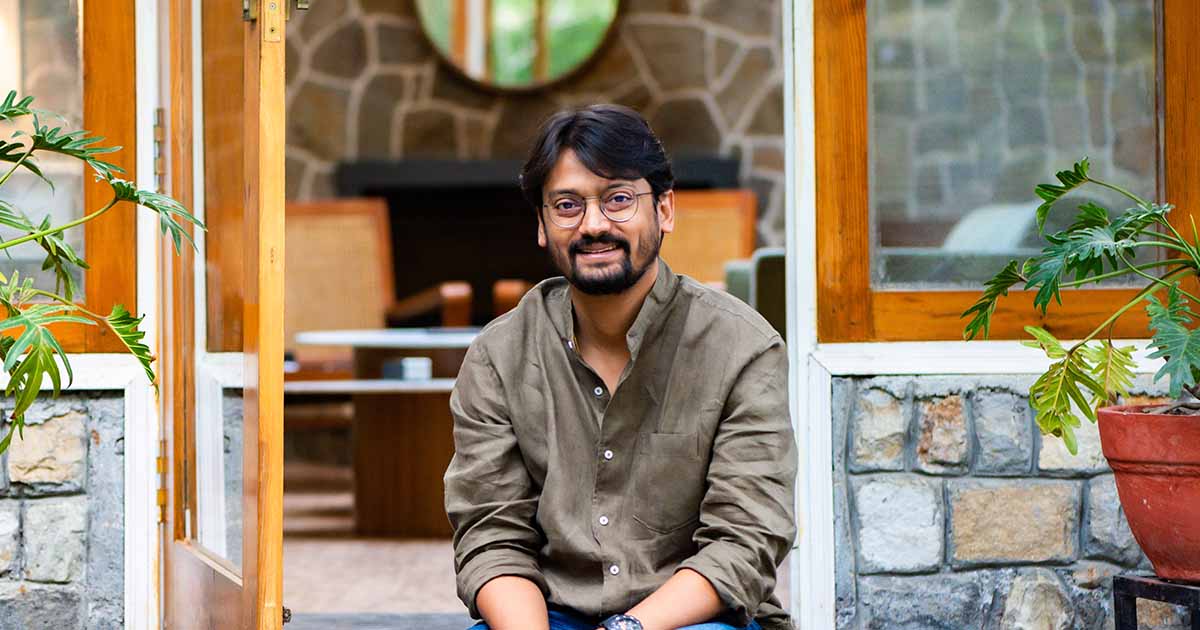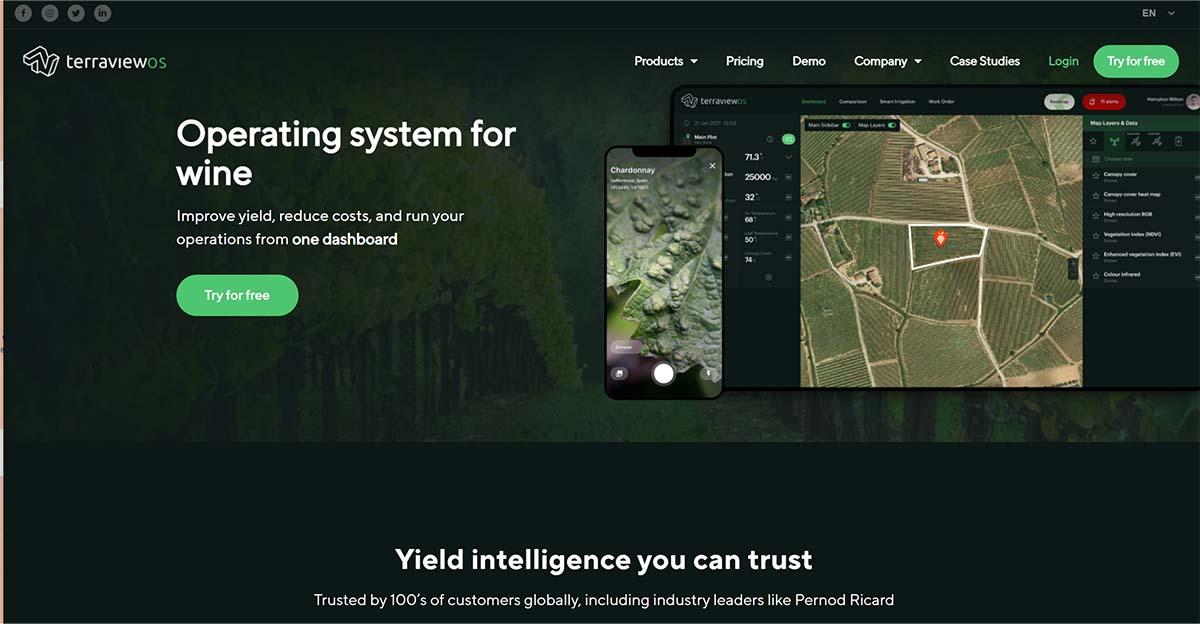Terraview Profile

Last Updated: By TRUiC Team
Terraview is a climate software-as-a-service (SaaS) startup that aims to solve problems and optimize systems for wine producers across the globe.
Interview With Prateek Srivastva
Describe your product or service:
“Terraview is an early-stage climate SaaS startup, and we are building an OS for wine.
Within six months of launch, over 185 wine producers across the world are using our product, and we add one wine producer to our platform every day.
Our customers use our platform to understand the 1) time of their yield, quantum of the yield, microclimatic weather, [and] labour needs, 2) place of disease impact [and] place to irrigate, and finally 3) projecting sales and procurement.
Our current build is focused on solving for production, and we are working on extending our capabilities to adjacencies of production, which will include winemaking and distribution.”
Describe your company values and mission:
“Our mission is to increase the GDP of wine and make it a carbon-neutral $1 trillion Industry.
Our Core Values:
- Create important products that add value, drive change, and are the best in their category
- Focus on select products, continuously develop, innovate, make them simple and durable.
- We are not satisfied with anything that is not exceptional, in each team, in each group, in each board.
- We are optimistic.
- Pride in taking initiatives, integrity in execution, humanity in accepting mistakes, and honesty when amending them
- We are for-profit, but we are here to make a positive contribution to society”
How are you funded? I.e. type of funding, number of funding rounds, total funding amount.
“Venture-funded. Two rounds of financing: Seed ($815,00) and pre-Series A ($3 million).”
How big is your team? Tell us a little about them (I.e. co-founders, freelancers, etc.)
“Team of 30. Two co-founders.”
How did you come up with and validate your startup idea? Tell us the story!
“I come from India, where 60% of the population is involved in agriculture. My family has been farming for over four generations.
A decade back, [the] climate started to act incoherently. We had a year of rains, another one with disease, one with drought, and one with pests. It's not that any of these did not occur before — they did — but never in such an accelerated or amplified manner. We were not prepared, we had no tools to anticipate any of it, and we lost all our crops for all those years, which led to a very stressful time both emotionally as well financially.
Because as a farmer, you just don't feed your family, but you all feed all the people working for you. My uncle, who was running the farm, was not able to handle it and committed suicide in 2013. He was not alone — that year alone, over 10,000 farmers committed suicide in India.
That defined what I had to build: a tool that will help the farming community deal with climate change. It was important to build for a crop that had the greatest number of lives [that depended] on it, and that's why we chose wine. Over 30 million people today depend on the wine industry to run their lives, and wine also happens to be the most temperature-sensitive crop in the world; therefore, it will get impacted first before any other crop.
Once it was clear that wine would be our start, I travelled all across Europe to understand the key challenges that wine producers were facing and it was clear that If the wine world continues to rely on old tools and methods, the world will not just witness record yield drops, it will also get closer to the projected danger of 70%-80% of wine production getting wiped out, paralysing a $400 billion industry.
We started building an MVP with a few wine producers in Spain to solve the single most pressing problem: estimating yield. Spent two to three years working on it, and when we launched in both Spain and US, we were 2x better than their current methods with 10x less effort and 5x more predictable.”
Did you always want to start your own business? What made you want to become an entrepreneur?
“Entrepreneurship is a way of life. I chose this way of life over 10 years back when I did my first startup. I have done two startups before this. One was in the HR services space which was acquired by a venture fund, and the other one was in the B2B enterprise learning space, which shut down because of lack of PMF.
My journey with entrepreneurship started with the discovery of truth: I was not very good at working for other firms. The 10 years that I worked prior to starting up, I changed like eight jobs, I was fired from two or three of those. It became clear at the end of 10 years that the fault wasn't with the employer; I just wasn't fit to be an employee.
That was the start, but the journey over the last 10 years has not just defined who I am [or] what I do, but most importantly, why I am doing it. This way of life is a continuous process, and the only way to lead this life is to get better every day, every minute, doing so with all humility, respecting and learning from colleagues and customers, working relentlessly, tirelessly on your mission, and staying focused.”
Who is your target market? How did you establish the right market for your startup?
“We target the SMB (small and medium wine businesses) across the world.
Over 1 billion people drink wine today — over 700 million across the US and Europe and around 300 million in SEA, Australia, and South America.
[The] wine world will add another 500 million consumers over the next three to five years, and by [the] year 2027, over 20% of [the] world population will be consuming wine, making it the most consumed beverage after water.
A majority of this will be produced by small and medium wine producers. This SMB cohort of 72,000 producers brings in almost 70% of wine GDP, and they collectively spend over $12 billion for intelligence, management, and operations in order to run production and distribution for their business.
This cohort has greater needs and is in deep need of tools to grow fast and stay climate-relevant, and that's why we chose this as our market segment.”
What's your marketing strategy?
“Community is our marketing strategy. Wine is a high trust society, and the only way you can do marketing at our stage is by building a cohort of people who trust you and can help build the brand. We worked very hard to build our product and got some of the greatest minds in the space [to] use it. Once they were happy and satisfied with what we had built, we built a cohort of influencers (14 today). These influencers, who are industry veterans, helped build out our brand across our key markets in Spain, the US, Australia, New Zealand, South Africa, Chile, and Argentina.”
How did you acquire your first 100 customers?
“Our GTM is direct sales. Our sales team directly reached out to hundreds of wine producers in respective regions, [and] our first priority was to go out and show the product to as many as we could and collect feedback and build better.
Once we launched, we reached out to over 700-800 wine producers, mostly across Spain [and] the US, and once we showed what we had, over 100 of those signed up on our platform. All this during COVID and all on Zoom calls.”
What are the key customer metrics / unit economics / KPIs you pay attention to to monitor the health of your business?
- “Customer Acquisition — We currently add one wine producer to the platform every day. This will go 3x in the next three months, and this is a very important growth metric for us.
- Customer Engagement — Today, 70% of our users are weekly active and spend 20-30 minutes on the platform. We are constantly working to increase the engagement frequency and time spent. The tools need to have the same relevance as email in modern times.
- Gross Margins — Overall, we need to operate at very healthy gross margins. We constantly keep looking at how our spends are and what's the best way to build a profitable business.”
What's your favorite startup book and podcast?
“Podcast — ‘All In Podcast’
Book — There are quite a few. Some of the recent ones that I liked are:
- ‘Bitzscaling’
- ‘Psychology of Money’
- ‘High Output Management’”
Is there a tool, app, or resource that you swear by to help run your startup?
“There are many tools [for] dev, marketing, sales, collaboration, etc. Wouldn't like to call one out.”
What is something that surprised you about entrepreneurship?
“It accelerates wisdom and humility in ways that you can't imagine. You have to go through it to experience it.”
How do you achieve work/life balance as a founder?
“Much has been said about it. I have realised that there are no boundaries that you can draw. As a founder, at least I am like a computer system that is either online or on standby. It never shuts down.
What I do is effective time allocation. Which allows me to spend time doing things that is not work. Weekends are for family, and I am a big believer in doing things in bits (10-15 minutes), but consistently, I take time out every day to read, learn music, learn language, and exercise. These activities help me recover, provide fresh thinking, and it also provides an alternate sense of achievement.”
What is a strategy you use to stay productive and focused?
“Your mission is super critical. If you are mission-driven, that will make you do all that is uniquely necessary for you to be productive and focused. A strategy [of] being productive or focused is going to be unique for each individual. For me, my mission makes focusing organic, and I use best practices used by startups who have gone through the same stage of growth and learn from experiences of entrepreneurs who have done this before as a tool to foster productivity.”
Did you have to develop any habits that helped lead you to success? If so, what are they?
“With Terraview, I started my fitness journey. From my previous startup stints and learnings from fellow entrepreneurs, I figured out that building great products/companies is a consequence of many good decisions and those can only be made when you have an optimum state of mind. To achieve that, I started my fitness journey, and today, I spend time exercising every day, made my sleep time predictable, and started regular meditation.”
What was your first job and what did it teach you?
“I was a sales rep with a very small desktop PC assembly company. That first job taught me that if you are going to be selling, the first step should be to stop worrying about what people will say or think, just go out every day and sell, until they buy or throw you out.”
Recommended:
- Keep up with more startup companies by visiting our list of the top startups to watch.
- Hear startup stories from real founders on the Startup Savants podcast.
- Form your own startup by reading our review of the best online incorporation services.
Tell Us Your Startup Story
Are you a startup founder and want to share your entrepreneurial journey withh our readers? Click below to contact us today!
More on Terraview

Founder of SaaS Startup Terraview Shares Their Top Insights
Prateek Srivastva, founder of SaaS startup Terraview, shared valuable insights during our interview that will inspire and motivate aspiring entrepreneurs.

Here’s How You Can Support SaaS Startup Terraview
We asked Prateek Srivastva, founder of Terraview, to share the most impactful ways to support their startup, and this is what they had to say.


